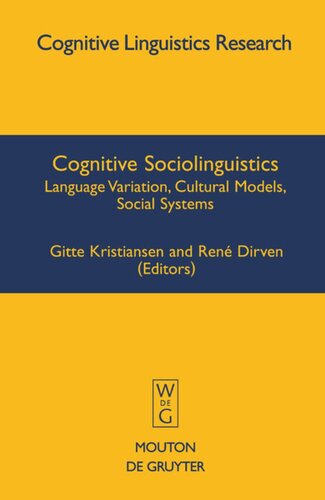

Most ebook files are in PDF format, so you can easily read them using various software such as Foxit Reader or directly on the Google Chrome browser.
Some ebook files are released by publishers in other formats such as .awz, .mobi, .epub, .fb2, etc. You may need to install specific software to read these formats on mobile/PC, such as Calibre.
Please read the tutorial at this link: https://ebookbell.com/faq
We offer FREE conversion to the popular formats you request; however, this may take some time. Therefore, right after payment, please email us, and we will try to provide the service as quickly as possible.
For some exceptional file formats or broken links (if any), please refrain from opening any disputes. Instead, email us first, and we will try to assist within a maximum of 6 hours.
EbookBell Team

4.1
20 reviewsA union of Cognitive Linguistics and Sociolinguistics was bound to happen. Both proclaim a usage-based approach to language and aim to analyse actual language use in objective ways.
Whereas Sociolinguistics is by nature on the outlook for language in its variety, CL can no longer afford to ignore social variation in language as it manifests itself in the usage data. Nor can it fail to adopt an empirical methodology that reflects variation as it actually occurs, beyond the limited knowledge of the individual observer. Conversely, while CL can only benefit from a heightened sensitivity to social aspects, the rich, bottom-up theoretical framework it has developed is likely to contribute to a much better understanding of the meaning of variationist phenomena.
The volume brings together fifteen chapters written by prominent scholars testifying of rich empirical and theoretizing research into the social aspects of language variation. Taking a broad view on Cognitive Sociolinguistics, the volume covers three main areas: corpus-based research on language variation, cognitive cultural models, and the ideologies of sociopolitical and socio-economic systems.